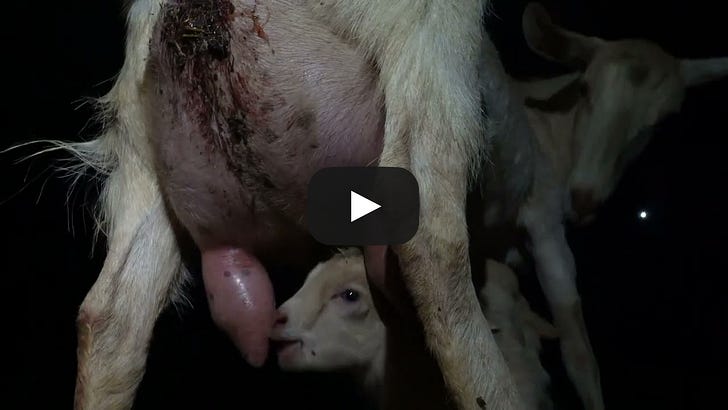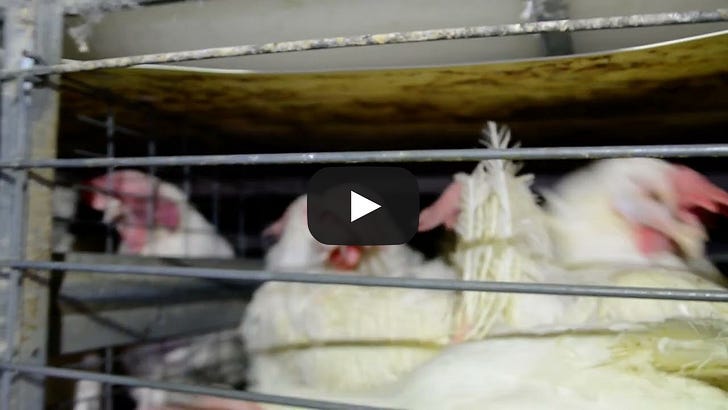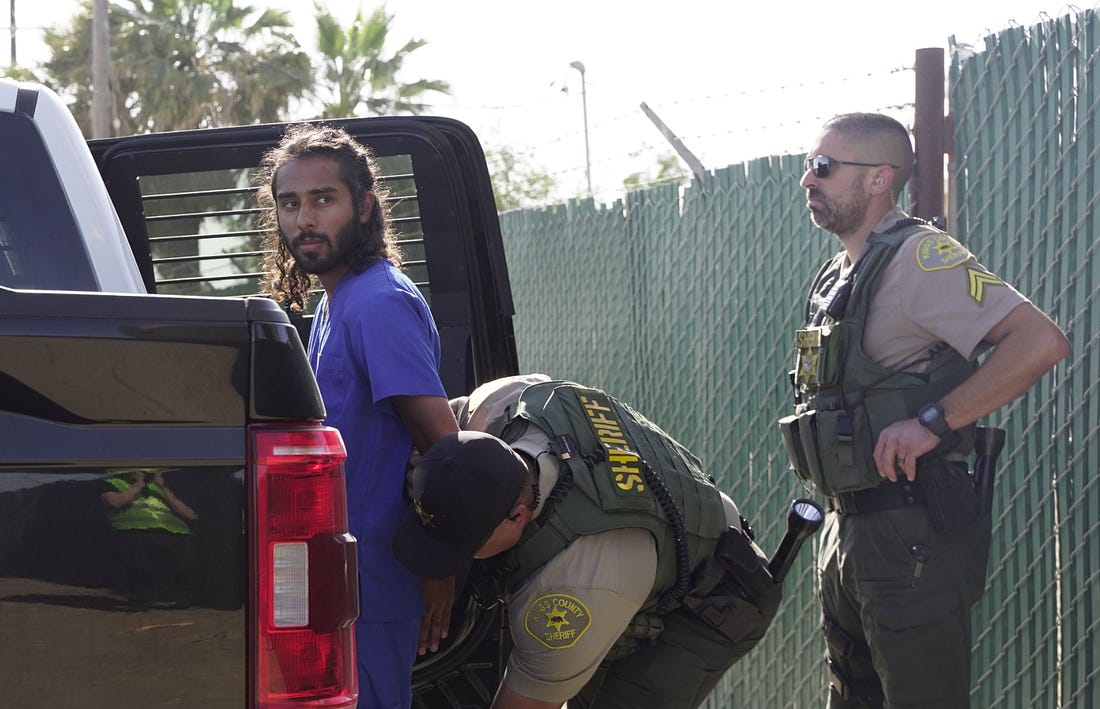|
The Bitter Lesson of Animal Welfare
A new open rescue shows that progress in animal welfare has major challenges. But there is a silver lining.
What if our efforts to improve animal welfare have backfired?
That is the question posed by the latest open rescue by Direct Action Everywhere (DxE) at a Certified Humane supplier of goat milk to Whole Foods, Vera Dairy in Stratford, California. The rescue, which found dead baby goats illegally piled up by the dozens at the farm, revealed disturbing gaps in accountability to the industry’s own welfare standards. Mother goats at the farm had udders so infected that they had swollen up to the size of a football, likely due to a disease called mastitis. The mothers’ milk production stopped, and babies were found emaciated and starved to death at the farm.
When activists presented evidence of these abuses to the industry and government officials responsible for animal welfare, the officials’ response was to arrest five activists for rescuing two sick baby goats from the farm — and do nothing about the animal abuse.

For those who are concerned about cruelty to farm animals — which includes 80% of Americans — this should be infuriating. And Vera Dairy is just the latest example of a supposedly humane farm failing to live up to its own standards. Last year, Farm Forward found cows festering with cancer eye at one of California’s most prominent organic dairy farms. In 2021, PETA exposed workers stomping on injured turkeys at a Global Animal Partnership certified farm in Pennsylvania. And back in 2016, teams that I led found numerous egg farms raising hens in Certified Humane sheds where thousands of birds were being illegally caged and cannibalized.
This is not cherry-picked data, moreover. The Animal Welfare Institute submitted public records requests to state governments across the nation to check on enforcement of animal welfare laws. They found that, out of 44 state laws protecting farm animal welfare in the US, only 12 had any level of enforcement at all. And, in many cases, this “enforcement” was pitiful.
For example, the state of California disclosed that it had supposedly enforced the state ballot initiative banning battery cages for egg-laying hens, originally passed in 2008 (Prop 2). But this “enforcement” consisted of a single investigation of a single company, which the government refused to name, out of the tens of millions of hens who have lived and died in factory farms since the law went into effect.
This comes despite clear evidence that numerous egg farms in California have violated the law. The owner of a major egg producer in California, Mike Weber, lied under oath by claiming at my recent trial that his company had no battery cages after Prop 2 went into effect. I nearly burst out laughing in the courtroom. We had hours of footage of hens at Sunrise in battery cages. (See for yourself in the video below, which the judge prohibited us from showing to the jury.) But the only consequence of these repeat violations of law was for the government to send me to jail for attempting to give aid to dying hens at the farm.

You can probably understand why PETA and Animal Rising have chosen to protest animal welfare certification programs. In the worst case, animal welfare programs are worse than ineffective. They actively cover up the cruelty.
And yet I stand by my statement in a recent newsletter that, in terms of influence on the industry, animal welfare reforms are among the most important victories in animal rights history.
This is partly because I think the enforcement problem in animal welfare is being fixed. We are wising up to the lies told by people like Adele Douglass of Certified Humane. When we exposed mass cannibalism at a Certified Humane egg farm in October 2016, Douglass’s organization wrote there was “no evidence” of aggression at the farm and that our video was “staged.” They never bothered to correct themselves when the company at issue admitted on the stand, and in documents they were compelled to disclose to us in court, that shockingly high mortality rates (20.3%) at their facility were driven by the animals pecking one another to death, i.e., cannibalism.
The animal welfare movement for many years stood by Douglass and Certified Humane. The Humane Society of the United States was listed as one of their most prominent supporters back in 2016. But HSUS eventually dropped their endorsement. Now, animal welfare organizations are suing Certified Humane for fraud instead of supporting them. This is progress for enforcement.
Even more important than enforcement, however, is long-term strategy. I have spoken to many leaders in animal welfare across the globe, and they’re all telling me the same story: it has been hard to make progress in animal welfare beyond cage-free. The most prominent animal welfare campaign of the last few years, the Better Chicken Commitment (or BCC, a policy of raising slow-growing breeds of chicken which suffer from fewer health issues), has struggled because of a lack of consumer interest. While this failure is disappointing, it is also triggering internal reflection on the movement’s long-term strategy — and innovation by enterprising animal advocates.
Activists in Denmark, for example, reframed the BCC by mocking conventional breeds of chicken as “turbo chickens” — and convinced the largest slaughterhouse in the nation to drop the fast-growing breeds. Other organizations, such as Mercy for Animals, are partly pivoting away from animal welfare campaigns to new strategies such as farm transformation. But above all, what I am hearing from the animal welfare camp, including some of the brilliant leaders at Anima International, is that winning cage-free isn’t enough if we don’t have a strategy for what’s next. The solution to this strategic problem — which I’ve previously called the Day 2 Problem — is being vigorously debated and discussed. That, even more than any specific improvement in enforcement, is probably the most important sign of progress.
The truth is that, in a broken system, all efforts at change are difficult. It’s like trying to build a sand castle on a beach where waves crash and destroy everything you’ve made. The key to steady progress, in a context like this, is to have a deeper understanding of the system. How far up the beach do the waves crash into the sand? What materials or methods can we use to resist their destructive power? To achieve enduring results, general learning and experimentation are far more important than building a specific castle.
I’ve called this the bitter lesson of organizational intelligence, based on a famous paper in artificial intelligence research. We are not as smart as we think we are, so the most important thing for us to do is to build a general infrastructure to adapt and learn. It is a bitter lesson because we all want to believe that the specific thing we are doing is the thing that will definitely work. But as Socrates said thousands of years ago: “The only true wisdom is in knowing you know nothing.”
The lesson is a bitter one indeed. But something remarkable can happen when we accept its truth. Our intelligence and ability to create change grows exponentially, as we adapt to the new challenges we face. (This is precisely what happened to artificial intelligence when researchers moved away from narrowly-tailored algorithms towards general abilities to learn: ChatGPT was born.) The animal welfare campaigns aren’t perfect. No campaign is. But over the long term, the things we learn from them — as long as that knowledge is shared and refined — will be their most important success.
Thank you for reading The Simple Heart! To help us reach more people, become a donor today.
